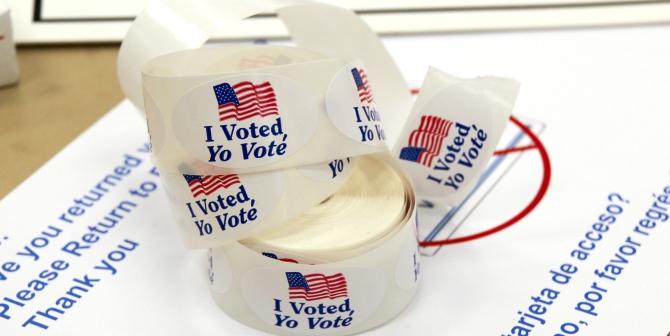 Voters in the Old Dominion State will go to the polls on November 7th to choose their next Governor. Lauren C. Bell writes that in the age of Trump, the race between Democrat Ralph Northam and Ed Gillespie is not a typical off-year election. With Gillespie tacking to the right, both national parties are watching Virginia’s election to see if Trump-like strategies are an election winner ahead of the 2018 midterms.
Voters in the Old Dominion State will go to the polls on November 7th to choose their next Governor. Lauren C. Bell writes that in the age of Trump, the race between Democrat Ralph Northam and Ed Gillespie is not a typical off-year election. With Gillespie tacking to the right, both national parties are watching Virginia’s election to see if Trump-like strategies are an election winner ahead of the 2018 midterms.
The 2017 Virginia gubernatorial contest features the incumbent Lieutenant Governor, Ralph Northam, a Democrat and former state senator, who has maintained a career as a pediatric neurologist in his spare time. Former Republican National Committee Chairman Ed Gillespie, who served as counselor to President George W. Bush and who has a long history of involvement in state and national politics, is challenging Northam.
Northam has been the frontrunner since the race began; Northam’s boss and current Virginia governor, Terry McAuliffe, is popular, and Northam is respected by Republicans and Democrats alike for his history of working across the aisle as a state Senator. In Gillespie, Republicans have a seasoned campaigner whose deep ties to the Republican Party and very close loss to US Senator Mark Warner in 2014 makes him a formidable challenger.
Some pundits anticipated a relatively dull race; both men have lengthy public service records, are in their mid-to-late 50s (Northam is 58, Gillespie is 56), and come from the establishment wings of their respective parties. Voters might even have been forgiven for confusing the two men, who look more than a bit alike. The candidates are even using the same color palette—green, white, and blue—for their printed materials.
A Deeply Negative Campaign
But when Gillespie only narrowly beat Corey Stewart, a Trump-style candidate, in June’s Republican primary, the dynamics of the race changed, with Gillespie’s campaign strategy taking a hard right turn. This rightward shift and Gillespie’s ramped up, Trump-style politicking have become the defining characteristic of the gubernatorial race.
As MSNBC’s Chris Hayes’ tweeted, the shift in Gillespie’s strategy meant that:
Gillespie beat Corey Stewart only to turn around and run as Corey Stewart. https://t.co/FuBXQIgVfB
— Chris Hayes (@chrislhayes) October 4, 2017
In September Gillespie launched a series of attack ads that claimed that Northam supports sanctuary cities and has empowered the violent MS-13 gang, making Virginia less safe. The ads grossly distort Northam’s record, but recent polling suggests that since they began running Gillespie has gained ground on Northam. Perhaps emboldened by these results, Gillespie is now running ads accusing Northam, who supports the right of convicted felons to have their civil rights restored once they have served their sentences, of supporting the rights of convicted child molesters to own guns.
Only a few years ago, such over-the-top ads would have been anathema to a large swath of Virginia voters. Now Gillespie is banking on them to turn out the Corey Stewart primary voters—although he risks turning off more moderate party members in the process. An article in the Richmond Times Dispatch explained Gillespie’s dilemma this way: “To break the Republicans’ statewide losing streak in a state trending Democratic, Gillespie needs the support of diehard Trump fans in rural areas and more moderate Republicans in heavily populated suburbs.”
Northam has also flirted with negative campaigning, but his efforts have been less effective than Gillespie’s, in no small part because the centrist Democrat is clearly uncomfortable with doing it. Moreover, Gillespie’s lack of prior public office holding or voting records on which to hang an attack, means that the Northam campaign has had to settle for linking Gillespie back to the 2002 Enron collapse—Gillespie’s public relations firm represented the company at the time. Not surprisingly, however, calling Gillespie “Enron Ed” hasn’t gained the Democrat any ground.

“Lt. Gov. Ralph Northam” by VCU CNS is licensed under CC BY NC 2.0
“Ed Gillespie” by Gage Skidmore is licensed under CC BY SA 2.0
What to watch
Gubernatorial elections are generally of low salience in Virginia, one of just two states that holds elections for governor in odd-numbered years. Without the draw of a presidential election to bring voters to the polls, turnout for gubernatorial elections is typically about 60 percent of the state’s presidential election turnout. In 2013, just 43 percent of registered voters cast a ballot in the governor’s race.
In addition, Virginia’s statewide races are often won by very narrow margins. Just 56,000 votes out of more than two million cast decided the 2013 gubernatorial election between Terry McAuliffe and Ken Cuccinelli; that same year, Mark Herring won the race for Attorney General by less than 1,000 votes out of more than 2.2 million. With polling on the race showing it narrowing as the election approaches on November 7, it is likely that whichever man wins will do so quite narrowly. Northam appears to be retaining a slight edge, but as noted above, his comfortable lead seems to have evaporated as Gillespie has ramped up his attacks.
And so while turnout always matters, it especially matters in this race. A small shift in the overall rate or demography of who turns out will make a big difference, and that may depend on local races as much as on the contest at the top of the ballot. In a state that regularly sees more than three-fifths of its general assembly seats uncontested, this year there are challengers for two-thirds of the seats in the House of Delegates. Northam is hoping to that grassroots enthusiasm among Democrats—who are contesting races in significantly greater numbers than they did in previous elections—drives an increase in votes for him.
A Harbinger for 2018?
It is no surprise that the dynamics that shaped the 2016 presidential election continue to be relevant to this year’s Virginia gubernatorial contest. In advance of the 2018 congressional midterm elections, both major political parties are watching the race carefully as they try to gauge the effect of the Trump presidency on state and local races. If Gillespie wins using the Trump playbook, it will even further embolden other Republican candidates to run hard to the right and will likely continue to escalate the divisive rhetoric and dog-whistle politics that Trump used so effectively in 2016.
If Northam wins—and especially if he wins due to greater energy among the Democratic grassroots—it will energize Democrats as they head into the 2018 congressional midterms, and the Virginia governor’s race will be held up as evidence by both parties that there are limits to the scope and reach of Trump-style politics.
No matter what happens, this race will be remembered for Gillespie’s stunning rightward turn. In his 2006 book, Winning Right: Campaign Politics and Conservative Policies, Gillespie wrote: “The best thing in politics is to run as who you are on things you believe in and win. The worst thing is to run as who you’re not on things you don’t believe in and lose” (137). Gillespie didn’t say, however, what happens when you run as someone you’re not and win—but he and his fellow Virginians may find out on November 7.
Please read our comments policy before commenting.
Note: This article gives the views of the author, and not the position of USAPP – American Politics and Policy, nor the London School of Economics.
Shortened URL for this post: http://bit.ly/2lrOzFf
_________________________________
About the author
 Lauren C. Bell – Randolph-Macon College
Lauren C. Bell – Randolph-Macon College
Lauren C. Bell is Professor of Political Science and Dean of Academic Affairs at Randolph-Macon College in Ashland, Virginia. She is the author of Filibustering in the US Senate (Cambria Press: 2011) and Warring Factions: Interest Groups, Money, and the New Politics of Senate Confirmation (The Ohio State University Press: 2002), and co-author of Slingshot: The Defeat of Eric Cantor (CQ Press 2015). She served as a United States Supreme Court Fellow during 2006-07, and was an American Political Science Association Congressional Fellow on the US Senate Committee on the Judiciary from November 1997 until August 1998.






